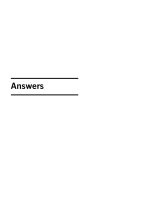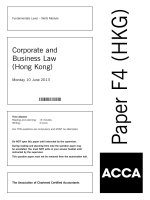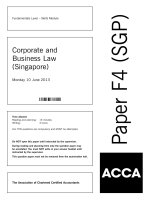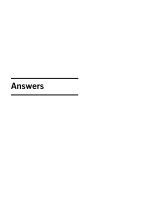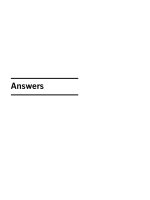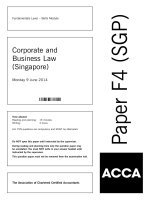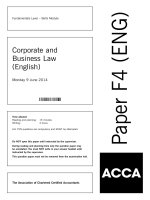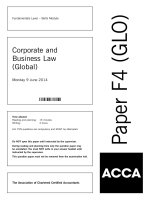Acca f4 corporate and business law russia 2014 dec answer
Bạn đang xem bản rút gọn của tài liệu. Xem và tải ngay bản đầy đủ của tài liệu tại đây (84.69 KB, 5 trang )
Answers
Fundamentals Level – Skills Module, Paper F4 (RUS)
Corporate and Business Law (Russia)
December 2014 Answers
Section A
1
2
3
4
5
6
7
8
9
10
11
12
13
14
15
16
17
18
19
20
21
22
23
24
25
26
27
28
29
30
31
32
33
34
35
36
37
38
39
40
41
42
43
44
45
C
B
B
D
D
B
A
A
B
D
B
C
A
A
D
A
C
B
D
B
C
D
C
A
B
B
C
A
B
A
B
A
A
C
B
C
C
C
D
C
B
B
A
C
B
Section B
1
Part 1, s.III of the Civil Code sets down provisions in relation to civil obligations.
(a)
By withdrawing from the seminars, Olga is in breach of contract. As the company had to incur additional expense in engaging
a replacement, it may file a claim for damages to the court. Damages are usually assessed with reference to missed profits
and de facto losses, so the additional expense falls into the latter category.
Additional damages may also be claimed for any consequences of the negative feedback in respect of the replacement
lecturer’s presentations. This could be assessed by considering the impact of lost bookings, cancellations and possibly
damage to the reputation of –OOO- Teaching.
(b)
–OOO- Teaching entered into a contractual obligation by accepting reservations for its seminars from –OOO- Firm, and so has
a commitment to deliver the seminars. In the absence of any exclusion clauses in the contract, –OOO- Teaching would be
liable to pay damages to –OOO- Firm in respect of the additional costs of employing agency staff.
17
(c)
The problems are usually pre-empted by companies such as –OOO- Teaching in two ways:
First, it should have included a forfeit in the contract with its speakers through which their potential liability for withdrawal
could be determined.
Second, it should have included a clause in the booking contract reserving a right to cancel any seminar by giving notice to
its customers, and accepting no liability for consequences of cancellation. This is a standard exclusion clause used by many
commercial businesses.
2
(a)
In an unlimited partnership, all partners share responsibility for liabilities on a joint and several basis. All partners own all the
income and incur all the expenditure. The general provisions relating to unlimited partnerships are laid down in
Articles 69 et seq of the Civil Code.
In the case scenario, by walking away from the project, Natasha has failed to complete her obligation. The extent to which
she will be entitled to income from the project depends on any relevant provisions in the partnership agreement. In the
absence of such provisions, her entitlement to income may depend on her contribution to the project. Veronika would argue
that by walking away she has improperly performed the obligation and is therefore entitled to no income from the project.
Both partners are jointly and severally liable to expenditure incurred in relation to the project, including the additional costs
of completing the work, though the partnership agreement may lay down specific conditions in this respect.
(b)
Veronika may take civil action against Natasha to recover the additional costs of completing the project. This would be
assessed on the basis of the difference between the projected cost had the work been completed by both of the partners, and
the actual cost taking into account the extra expenditure incurred.
As Natasha’s withdrawal resulted in there being only one partner remaining, the partnership must be terminated, so Veronika
could also claim for loss of income in respect of forthcoming work. Her case is supported by Article 77 of the Civil Code,
which specifies that withdrawal is subject to no less than six months’ notice.
(c)
Article 75 of the Civil Code states that each partner is liable for obligations incurred by the partnership for a period of
two years after the partnership is terminated.
Both Natasha and Veronika would therefore be liable for any obligations incurred while the partnership was active. These
costs could extend to any work instigated by the partnership but incurred after Natasha’s departure.
3
(a)
Ordinary shares provide no guarantee of income or capital preservation. Dividends paid on ordinary shares are recommended
to the general meeting of shareholders by the board of directors. Dividends are only payable out of profits and other
distributable funds, so if the company is not profitable, no dividends can be paid. The directors may also decide not to
recommend a dividend if it is in the interest of the company to retain profits and not distribute them. Further, ordinary
shareholders can see the value of their investments increase or decrease.
Preference shares provide for a fixed dividend, payable out of profits or special funds set aside. Again, dividends are not
guaranteed, as they are subject to funds being available for distribution. However, preference shareholders are paid ahead of
ordinary shareholders, and their rights to a dividend are usually cumulative. The capital value of preference shares can
increase or decrease.
Corporate bonds are created by a civil contract between a debtor and a creditor, so interest must be paid and the capital must
be returned to the investor when due. Failure to do so entitles the investor to take legal action against the company. However,
both capital and interest are dependent on the company’s performance.
(b)
On insolvency, ordinary shareholders are paid after all other obligations of the company have been met. This means that they
pose the greatest risk to the investor. If the company is insolvent, the shareholder must receive less than the capital value of
the shares, as any shortfall in respect of assets to liabilities will be taken out of capital.
The capital due to preference shareholders is paid ahead of the ordinary shareholders but after all other obligations have been
met. Preference shares are therefore a more secure investment, but there is no guarantee that the liquidation fund will meet
the capital due on them.
Corporate bonds may be secured or unsecured. If secured, the investor can rely on the collateral, but if unsecured, the owner
of the bond stands as a creditor. As such, the investor is paid ahead of all shareholders but after payments due to the
liquidator, secured creditors with prior claims and preferred creditors (such as employees).
4
(a)
The funding of the project is a major transaction within the meaning of Article 78 of the Federal Law on Joint-Stock
Companies. A major transaction is any transaction which is 25% or more of the book value of the company’s assets at the
last reporting date.
As the transaction is between 25% and 50% of the value of the company’s assets, a decision on it must be agreed
unanimously by the board of directors. If the directors are not unanimous, the decision must be taken by the general meeting
of shareholders.
18
(b)
Most commercial decisions by the management of a joint-stock company are subject to risk. However, Article 71 of the
Federal Law on Joint-Stock Companies requires directors to act in good faith and in the best interests of the company. This
is supported by Article 53 of the Civil Code.
Failure to act in good faith and in the best interests of the company can render the director liable to action by both the
company itself and by the shareholders, subject to the establishment of a causal link between the actions of the director and
the damage suffered.
These responsibilities must be balanced by the need for those who manage the company to take commercial risks, as
acknowledged by Article 5 of the Civil Code. An executive who has voted against the decision cannot be held liable.
5
(a)
Insider dealing is buying or selling shares in listed companies based on price-sensitive information which is not in the public
domain in order to make a profit or avoid a loss. The offence can only apply to dealings in securities which are traded on a
recognised capital market.
The information on the merger was price-sensitive information, and Yuri had access to this by virtue of his position in the
company. Therefore he has been able to take advantage of his access to the information by buying relevant securities and
making a profit.
(b)
Money laundering is concealing or disguising the proceeds of crime to make the funds appear legitimate.
By investing the proceeds of insider dealing in his company, Yuri has disguised the funds as a consultancy fee. These funds
lay concealed until the company paid dividends to him. In this way, Yuri converted funds illegally obtained into apparently
legitimate payments.
19
Fundamentals Level – Skills Module, Paper F4 (RUS)
Corporate and Business Law (Russia)
December 2014 Marking Scheme
Section A
1–45
One or two marks per question, total marks 70
Section B
1
2
3
4
5
(a)
Recognition of entitlement to damages
Further explanation of measure of damages
1 mark
1 mark
(2 marks)
(b)
Recognition of entitlement to damages
Further explanation of measure of damages
1 mark
1 mark
(2 marks)
(c)
Addressing problem of replacing lecturer
Addressing cancellation of seminars
1 mark
1 mark
(2 marks)
(Total 6 marks)
(a)
Application of partnership law
Up to 2 marks
(2 marks)
(b)
Application of partnership law
Up to 2 marks
(2 marks)
(c)
Provisions of Civil Code on termination
Other application
1 mark
1 mark
(2 marks)
(Total 6 marks)
(a)
Legal characteristics of ordinary shares
Legal characteristics of preference shares
Legal characteristics of bonds
1 mark
1 mark
1 mark
(3 marks)
(b)
Rights on liquidation of ordinary shareholders
Rights on liquidation of preference shareholders
Rights on liquidation of bondholders
1 mark
1 mark
1 mark
(3 marks)
(Total 6 marks)
(a)
Law on large scale transaction
Application
1 mark
2 marks
(3 marks)
(b)
Duty to act in best interests
Application
1 mark
2 marks
(3 marks)
(Total 6 marks)
(a)
Definition of insider dealing
Application
1 mark
2 marks
(3 marks)
(b)
Definition of money laundering
Application
1 mark
2 marks
(3 marks)
(Total 6 marks)
21
